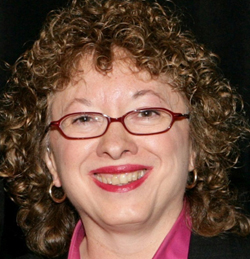Taking advantage of the process and the trend, Appeeling Fruit has grown from three employees to 50 since its founding in 1991. Its is rapidly becoming a regional processor, supplying school food services throughout the United States east of the Mississippi.
Founder Stephen Cygan, a 1976 graduate of Delaware Valley College with a degree in horticulture, says keeping in touch with cutting edge shelf-life extension research helped him be in the right place at the right time.
What inspired you to start Appeeling Fruit Inc.?
I worked at Ontelaunee Orchards [in Berks County] in several positions from the time I graduated from college to 1991. I had a dream of being an entrepreneur of some sort; I never thought I’d be in this business. But opportunities arise, and when this one did, I couldn’t walk away from it.
I started the business peeling and slicing apples for the bakery industry. I rented a space in Maidencreek Industrial Park and bought some used equipment, and with a handful of people we peeled and sliced apples for upscale bakeries. One of our first customers was Sweet Street Desserts [in Reading[.
The technology for keeping apples from browning changed dramatically around 1998. I had always been in close contact with some of the universities that were doing research on shelf-life extension and anti-browning agents. There was a project that the USDA was working on in conjunction with a pharmaceutical company, in which they came up with a processing system that was pretty revolutionary.
At the same time, the researchers were looking for someone to commercially test out this product. We got involved with this process and product in the early stages, and that gave us an opportunity to take this to market earlier than the competitors.
We initially thought this would allow us to serve the bakery industry in a larger geographic area, but we found that the cost was an obstacle. The bakery industry is pretty cost-sensitive, so adding another couple of cents per pound just wasn’t acceptable. So we started exploring other markets, and we contacted schools because it was a way to get a lot of volume in a limited number of sales venues. We got our foot in the door with several schools. We helped to pioneer a whole new market for packaged fresh apple slices for food service, and then for retail.
What is the process?
The patented product we use is calcium ascorbate, a vitamin C-type material generally regarded as safe. It’s an anti-oxidant, so it inhibits the natural browning process of cut apples. Bathing them in this solution keeps the reaction from occurring.
It’s not a preservative, however; it doesn’t keep microbial activity at bay. So from 2005 to 2007 we concentrated on how to create as much shelf life as possible by developing a cleaner process. We cut the apples in very sanitary conditions in a 35-degree climate with filtered air in the room — it’s almost like a clean room. That helps us maintain a 21-day shelf life.
How has your company grown?
When we started, our market area was southeastern Pennsylvania; now we ship product as far as New England, Florida and Mississippi.
Our leased area in Maidencreek Industrial Park started at 1,500 square feet; by the time we left it was about 4,500 square feet. In 2009, we moved to a warehouse in Dauberville that was about 24,000 square feet, where we installed the controlled processing rooms, and both dry and refrigerated storage areas.
We started with three employees; now we have 50. Our sales in the first year were about $250,000; in 2012, sales were up to $12 million.
Since 2009, We have gone from one cutting machine and two packaging machines to four cutting machines and five packaging machines.
What resources did you take advantage of in growing your company?
Ben Franklin Technology Partners [of Northeastern Pennsylvania] helped beginning in 2003. Over time they have been instrumental in helping us identify the right building to move into, and provided grant money to support our processing activities at a time when we were growing very fast.
We relied on [Small Business Administration] financing at times. The Greater Berks Development Fund has helped us identify some low-interest SBFF loans for equipment and a Pennsylvania Industrial Development Authority loan for the Dauberville property.
What was the biggest challenge in getting the business off the ground?
The first challenge was finding a growing customer base for bakery products — the first several years were a roller-coaster ride. The next challenge was figuring out what to do with the new anti-oxidant product: Identifying the market, pioneering the market, creating the market and then meeting the need with automated packaging — that was the big challenge.
What’s next for Appeeling Fruit?
We’d like to come out with sliced pears and other items that will work with our current system. This summer, we’ll start testing with peaches. We’re doing some different cuts with apples, and we’re exploring new markets — restaurants and possibly cruise ships.
What’s the big differentiator for your company?
We’re very focused on the quality of the apples we use. We use apples that respond well to the treatment, are available year-round and have a great taste. We also are a small, nimble company, so we can respond quickly to our customers’ demands for quick turnaround and other issues.
Writer: Susan L. Pena


http://appeelingfruit.com/
1149 Railroad Rd. Dauberville, PA 19533
↑ Top


